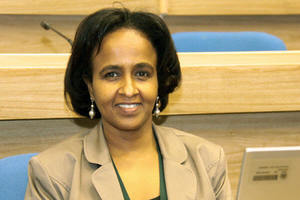
Kamar Yousuf is the Head of the Private Sector Unit at the United Nations Environment Programme (UNEP). The Unit functions as the coordinating hub for UNEP’s engagement with businesses and facilitates strategic partnerships.
Before joining UNEP, Kamar worked for the UN Political Office for Somalia to manage a multi-donor trust fund for peacebuilding. She devised a strategy for post-conflict reconstruction and capacity development of key Somali government institutions. Her focus was on building partnerships with other UN entities working in Somalia to increase the impact of peacebuilding activities.
To contribute to the resolution of the protracted conflict in Somalia, Kamar completed a Master’s degree in International Peace Studies at the University of Notre Dame’s Kroc Institute.
“I have been interested in understanding the complex links between peace, security and inclusive development,” said Kamar. “My time at the Kroc Institute provided an immense opportunity to discuss these links with like-minded classmates, academics, and distinguished leaders, such as Father Theodore Hesburgh.”
She also holds an MBA from the Monterey Institute of International Studies in California.
Her expertise and education led Kamar to join UNEP in 2007 as a Programme Officer in the Division of Environmental Law and Conventions, handling activities related to the implementation of biodiversity conventions and outreach. In 2009, she moved to another post as the Regional Focal Point for biodiversity and ecosystems related conventions for the Africa region. Her activities included capacity-building in multilateral negotiations, project management, fundraising, proposal writing, budgeting, monitoring, and evaluation.
Kamar has been instrumental in bringing new partners together to implement activities in the Africa region. One such project was the Korea Forest Service, which supported land restoration and conservation by planting trees in degraded areas throughout five African countries: Benin, Ethiopia, Ghana, Morocco, and Tunisia.
The project in Morocco, located in the city of Ouarzazate, utilizes treated wastewater delivered through solar-powered pumps to irrigate trees. The project catalyzed partnerships at national and local levels, as several government agencies and private sector organizations contributed both financial and technical support, and local residents' ownership of the project resulted in a high level of support and community engagement in looking after the trees.